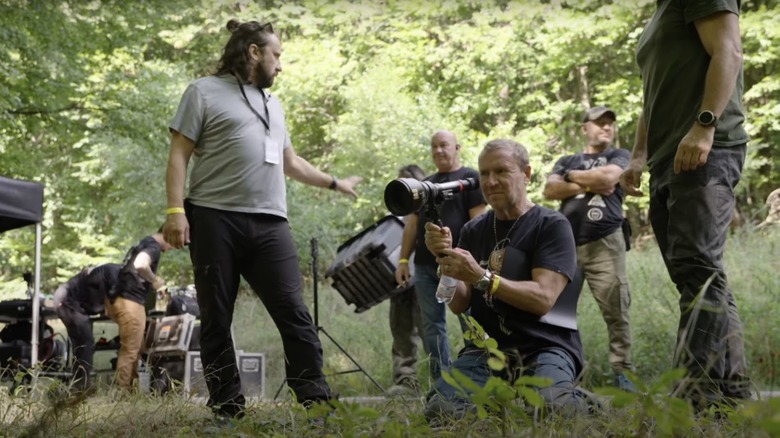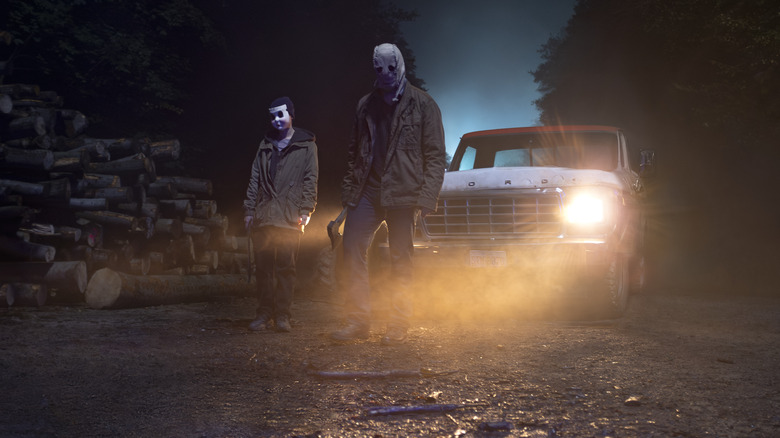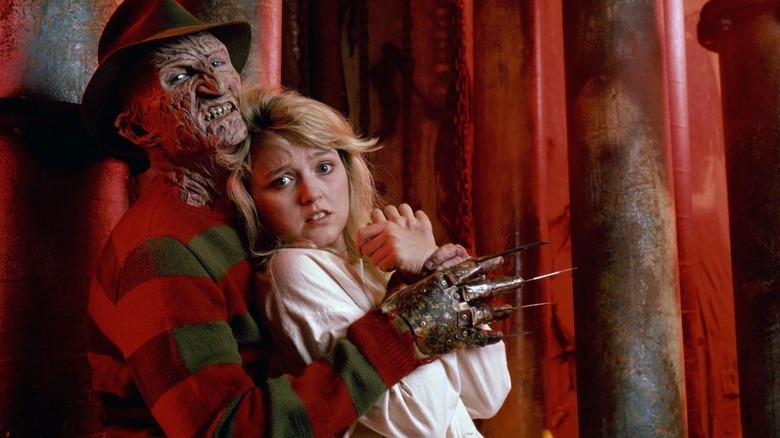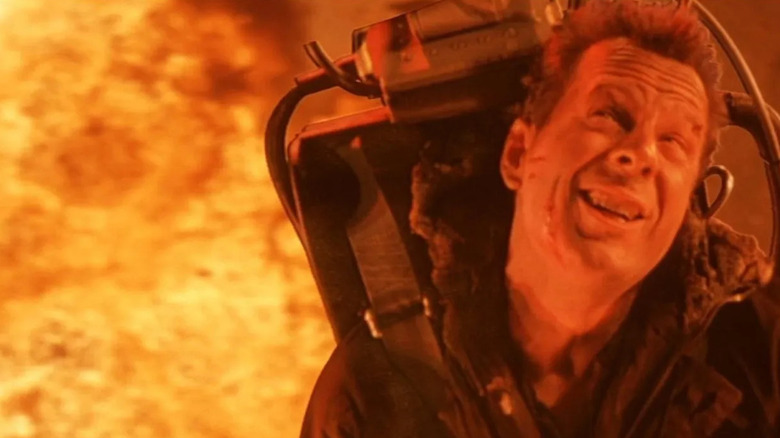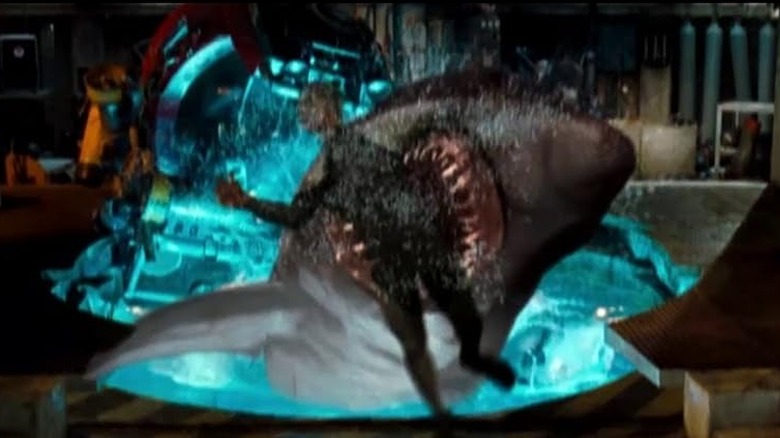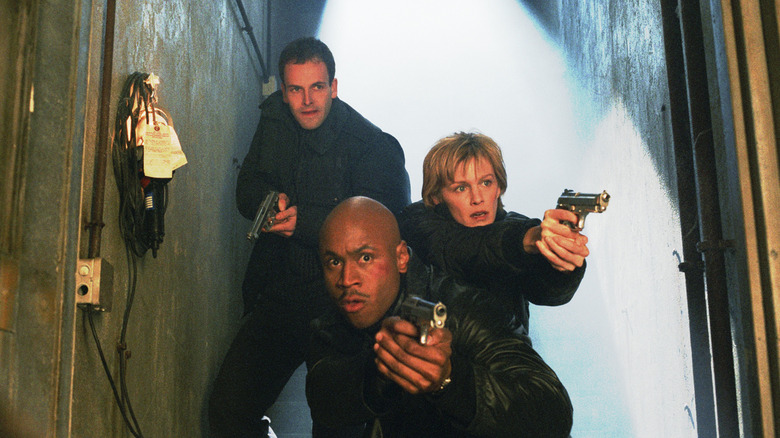Director Renny Harlin Breaks Down His Entire Career, From Freddy Krueger To The Strangers: Chapter 1 [Exclusive Interview]
Director Renny Harlin has made some of your favorite movies. He's also made some total stinkers. And the beauty of speaking to the filmmaker — who has carved out a unique niche across horror and action cinema for past four decades — is that he's completely aware of it. Here is a director who has been around long enough, who has seen every facet of the filmmaking machine from all possible angles, that he's willing to be straight-up honest about it. Like anyone with a filmography this large (and this wild), he has stories to share.
When I sat down with Harlin over Zoom to chat about his new movie, the horror reboot "The Strangers: Chapter 1," I hoped we could talk about his entire filmography. But 30 jam-packed minutes later, my time was up, and the sheer number of noteworthy movies we didn't get to was astonishing. But we did talk about his new take on the "Strangers" franchise, the wild swings he took with "A Nightmare on Elm Street Part IV: The Dream Master," his clashes with Bruce Willis while making "Die Hard 2," his vision for the version of "Alien 3" he almost made, his attempt to cast David Bowie in "Cliffhanger," the creation of the greatest death scene in movie history (yes, we're talking "Deep Blue Sea"), and so much more.
Frankly, Harlin is such an interesting figure, a conversationalist befitting someone whose filmography is so chaotic, that one imagines he'll never run out of stories to tell. But for now, this will have to do.
This interview has been lightly edited for clarity.
Renny Harlin was drawn to The Strangers because he could make a four-hour horror epic
"A Nightmare on Elm Street 4," "Die Hard 2," "The Strangers: Chapter 1," "Exorcist: The Beginning" — you've become the go-to guy for stepping in when a franchise needs a refresher or a new director. Why do you think you've become somebody who's seen as so reliable in this way?
God only knows. "Nightmare on Elm Street 4" was a fantastic stepping stone for me in a sense that I was getting into a franchise, fourth movie in the series, and I was a young filmmaker and I had lots of big ideas how to give the audience what I felt they wanted in that franchise and how also, to come up with some new ideas. We took some risks actually, but it worked. And actually, the movie was well-received and was successful. I think based on that, the powers that be felt like I was reliable in that sense, that I'm not going to go crazy and start doing my crazy ego trip. I will definitely put my own handprints on it, but stay within the framework, which to me is crucial. Why do a sequel or some kind of a reboot of something that people loved if you're just going to do your own ego trip?
Because you owe it to the audience. You have to be faithful to why [they loved] this particular movie. In this case, we had the classic, "The Strangers" from 16 years ago that really is, for many, is one of the best horror films. Myself too, because it was so revolutionary in a way. It didn't give any nicely packaged answers. It just showed the senseless danger of terror and violence. At this point in my life, I wouldn't have been interested in somebody saying like, "Let's just remake that movie," or "Let's do a sequel or random sequel and have The Strangers go somewhere else, kill somebody else." Because we were doing this four-and-a-half hour epic and dividing that into three chapters, I felt like what a unique opportunity to dig deeper into the psyche of both the victims and the killers themselves, and not to give some neat answer, but to explore these things in much more epic way than you get to do in a normal movie.
I think that to really answer your question, I just think that I've been doing this for a while and the studios find me reliable and they know that I love what I do, and I wouldn't at this point, like I said, I wouldn't just jump into some remake or sequel just because, but this was an opportunity I couldn't let go. I felt like it's such a fantastic opportunity to give audience what they loved, but to give them more.
In the original "Strangers" series, the sequel actually is a big tonal jump. The sequel is more crowd-pleasing and funny. Will your "Strangers" sequels see some tonal shifts as well, or are they going to be true to what you do in the first film?
Definitely true to it. We plan, after all the three chapters have come out, we plan to release the whole four-and-a-half hour odyssey as one movie and see who will last in the movie theater for four-and-a-half hours and go through that atmosphere of dread for that long. I think it's the key to this. Like I said, I feel like when I was doing something like a franchise like "A Nightmare on Elm Street," we veered really in certain ways to new directions and introduced more humor into it and so on. I think these movies, this franchise, the key is the sense of reality. You can't start taking licenses and saying, like, "It's a movie, so let's have a dancing number and let's have crazy paranormal things happen and let's make it into just a big cinematic party."
I think that the key is that this particular movie, you have to stay true to the fact that this is brutal real life. This is one of those situations that could happen to any of us and these brutal killers, these serial killers, there are those people, these sociopaths out there, and it's just — a violent crime happens, I think like every 32 seconds in the United States. It's just bad luck. But it could happen to any one of us if we just happen to be at the wrong place at the wrong time.
Renny Harlin wanted to transform Freddy Krueger into the James Bond of horror
There's a recurring trend across your filmography — movies that, whether they were successful at the time or weren't successful at the time, are reassessed and find an audience years later. A few years ago, I watched a repertory screening of your film "Prison," with a really excited midnight audience. Has that been something that you are aware of? Has it impacted how you make movies now?
Yes, it's been really awesome and flattering to ... I've been to some screenings, big screenings of "Prison," for example, which at a time when I made this, and this was in the '80s before "Nightmare on Elm Street," literally close to 40 years ago when I made it, I had very high goals and it was very low budget and all that, but very high goals of making a really good movie. And of course then when the release didn't really work out and all that, it felt like a failure. And you've just felt like "I poured my heart and soul into this and what was I left with in the end? A videotape that a handful of people saw." And to have people rediscover the movie decades later and arrange these big fan screenings and me getting a lot of feedback on that movie and having new generations of people appreciate it, it really validates the effort and it really makes you feel like, "Okay, I wasn't an idiot. It was just various factors conspired against this film at the time, but it's been discovered."
Honestly, and this might sound very lofty and like a bunch of bull to some people, but honestly, when I'm making a movie, any of my movies — and some of them are no masterpieces by any means — but I'm putting everything into it. My artistry, I never look at it like "This is just a bunch of entertainment." I look at it as an art form. I plan every shot, every angle, lighting, the costumes, the acting, the story, to the best of my ability. Sometimes it works, sometimes it doesn't. But to get validated later on and people rediscovering some movies, it is incredible. And it proves to me that it's worth doing it. And that's the only way how I can imagine doing this, which is that every time you take it incredibly seriously and you do your best, and then whether that magic happens with the audience at that moment or later or never, that's up to things that you can't control, but it definitely makes you feel like it's worth doing over and over again.
You talked about experience on "Nightmare on Elm Street 4," and I'd love hear your thoughts on one of the big ongoing horror debates. People still debate "serious" Freddy Krueger versus "comedic" Freddy Krueger, and I think your film walks this fine line where he's still scary, but also you're starting to introduce the sillier side. Do you remember on the set, the conversations you had with the actors and your fellow filmmakers to try to balance those tones?
Absolutely. And I take big responsibility for steering Freddy in that direction on the fourth movie. My thinking was that, what I told the producers, I said, I felt like by now the audience was in on the joke. They got it. To sell the same idea again, that Freddy is just this scary child molester, it wasn't believable anymore and that we had to introduce something new. And also, clearly Freddy had become the star of the movie. He wasn't just this scary, violent guy, but he was a bigger-than-life phenomenon. So the term I used when we started working on the movie and the script and the nightmares and everything, I said, "I think we have to make Freddy the James Bond of Horror." And so then everything we did, starting with his resurrection in the beginning of the movie and the low-angle, Steadicam shot pushing in on him and he puts his hat on and so on, iIt was really designed to make him the hero of these movies.
And yeah, he's killing these young people, and it's supposed to be scary, but we wanted to find this new kind of a balance in the movies. And I think that still we were able to, with certain sequences, really to dig into the angst of teenagers, whether it's being at school or these kind of sexual fantasies like the kid with the naked girl inside the waterbed and this kind of getting punished for sins that you do, it was still relatable. That was the whole idea of the main character Alice also, that her arc is that she turns from this mousy girl into this hero.
I think that to a certain extent, I feel like we were able to combine this kind of little bit of a superhero tale with some comedy, such as the faces of the victims on a pizza — which is, of course, outlandish. But it just, luckily to us, it created a balance where the audience was allowed to laugh and kind of have a good time and then also be kind of horrified by realization of all the scary murders.
Renny Harlin's unmade Alien 3 would've been set on Earth
I want to ask about a movie that you famously did not make. You were going to make "Alien 3," and you've discussed in interviews before about how you clashed the studio over your vision and how one of the deal breakers for the studio was that they didn't want it to set on Earth. Now, they're making an "Alien" TV show that's going to be set on Earth. And I'm wondering if, all these years later, you feel vindicated.
I always thought that I had a good idea. And you have to remember when you put it into perspective, I was working on "Alien 3" in '89, which was before "Jurassic Park" and all those movies. So the concept of having these creatures on Earth, for the studio, it felt scary and unattainable. For me, it was the natural evolution. We've had the alien with the truck drivers in space, we've had aliens with the Marines in space, and where do we go next? Let's bring the aliens on Earth and have them going through the cornfield. I had the poster already in my mind with the farmhouse and the cornfield in moonlight, and they are going through the cornfield. And to this day, I think it would've been a ginormous hit movie because it would've been the first time anything like that was done. But for whatever reason, the studio felt like, "Ah, the audience won't buy that. So let's put the aliens on a prison ship."
A prison ship? How am I going to relate to a prison ship? But that's ancient history. I'm not blaming anybody, but for those who don't know, I worked for a year on "Alien 3," and I quit politely, respectfully, because I couldn't stand the idea of, after Ridley Scott and Jim Cameron, coming up with a movie that is just not going to live up to what the audience is expecting and give them that experience. The key to me, just to say again about the "Alien" movies, was that they have to be relatable. They might be in outer space, but the characters are you and I in outer space, and that's what makes them tick. And that, I believe, is what makes "The Strangers" tick: It's you and me in that house.
Another one of your sequels was "Die Hard 2." I feel like every director who worked with Bruce Willis describes a different person. I can never get a handle on what it was like to work with him because everybody seems to have different stories. What are your memories of working with him on that film?
[sighs] Honesty is the best policy. It wasn't an easy movie to make. Bruce, after many, many years of "Moonlighting" — light TV comedy, romantic comedy — had become a movie star because he did "Die Hard," and now he was determined to make his mark as a serious movie actor. So he first sentence to me was "I don't want to do any of that stupid jokey [stuff]. I want to make the characters completely serious and real" and so on and so forth. And I was horrified. And I said to him, "I understand where you're coming from, but this movie is called 'Die Hard,' and what the audience, I guarantee to you, what they loved about it was your character, who's a blue-collar cop with marital problems which eventually he overcomes, and the love for his wife is the most important thing for him and his hatred for authority and his sarcastic way of looking at the world around him cracking some jokes."
That was the beating heart of "Die Hard." And we had to, of course, we were expanding the story and the environment and making the movie bigger, but we had to be truthful to that character. That was our big disagreement throughout the whole making of the movie. And I got our producer, Joel Silver, to become a referee in this situation, and we agreed finally that we will shoot the movie so that we would shoot as many takes the way Bruce liked his character to act, and then in the end, always one take of each scene where he does it the way I think he should do it, and with the lines that I think he should say and the reactions he should do. And that's how we shot the movie. But it wasn't — we weren't arguing, but there was always this atmosphere of him being reluctant and making fun of me because it was always like, "Okay, let's do the Renny Harlin take."
But we were friends. Bruce came to Finland, where I'm from, and everything, so I have great respect for him. He worked hard, but it wasn't the easiest experience. And when I showed the movie to the 20th Century Fox studios executives, they loved it, my cut. But their first question was, "Do you have any more of that funny stuff, because it's so good?" I said, "I've saved every outtake. Even if the camera was rolling accidentally and Bruce smiled, it's in the movie. So that's it. I squeezed everything out of it." But what it really taught me is, particularly in action movies, but I think in all kinds of movies, levity is gold. Even if you have the most tragic, dramatic movie, to give the audience a chance sometimes to smile, let alone have a little chuckle or burst of laughter, it's really valuable because it's real life and people enjoy that.
Legendary rock star David Bowie was the first choice for Cliffhanger's villain
One of my favorite performances in any of your films is John Lithgow in "Cliffhanger," one of the most deranged and fun movie villains of the '90s. What do you recall about working with him to build that character?
Excellent question. I have to preface that by telling you that first of all, in action movies or I guess in any kind of movies, your hero, your protagonist, is only as strong as the antagonist, the bad guy. If the bad guy is a loser, then there's nothing heroic for the hero to do. And I always look for something special, something to make not the [typical] bad guy, the mustache-twirling guy who is just going to blow up the whole universe with a nuclear weapon and loves doing it, but to find something special. My dream cast to play the bad guy in "Cliffhanger" was David Bowie. And I pursued him hard. I remember going to New York to meet with him and talking about the movie endlessly, but then it was very close, but I think maybe he had a tour or something happened that the schedules didn't work out. So David Bowie didn't play the bad guy.
My second choice was Brian Ferry, another legendary rocker. I went to England to meet with Brian. He came to L.A. to do a test shoot. The test shoot didn't go so well. Somehow though, I thought just in terms of his charisma and everything, he was perfect, but it didn't go so well, and we didn't end up casting him. And then we went in a different direction, which was John Lithgow, who was known for some comedy and drama and not really playing villains at all, but he was just physically imposing and acting-wise, a brilliant actor. I felt like, "Okay, here I can really find and create an interesting villain." So I just had a lot of talks with him, and it was a constant process throughout the shooting, and we had a lot of fun doing it.
A lot of his legendary lines were really, we came up with those lines on the spot on the set, when he kills his girlfriend and all kinds of things like that, and he does something. We didn't want to have stupid quips and stupid one-liners, but still he had many opportunities to show his wit. It was really thanks to John, but it was a constant kind of checking back and forth that we are not going over the top so he doesn't become like a character from "Austin Powers." So yeah, I love what he did.
The one scene every single person told me to ask you about, the scene that everyone remembers, is Samuel L. Jackson's death scene in "Deep Blue Sea." That film turns 25 this year, and it's got to be your calling card scene. How do you feel about so many people considering that moment to be the Renny Harlin scene?
I'm very happy and I'm proud to hear that people think that the Samuel Jackson death in "Deep Blue Sea" is the crucial Renny Harlin scene, and I take credit for it because the roots of that scene are in the fact that originally, that character didn't exist in the "Deep Blue Sea" script at all. However, I had just done "The Long Kiss Goodnight" with Sam, and we became good friends and we had sworn to work together always. So I was panicking because I didn't have any role to offer him. And then I talked to the producers and the writer and said, "We've got to invent something." And then I came up with the idea, which I completely stole from the first "Alien" movie, which was basically in that movie, there was nobody famous in it except Tom Skerritt, who played the captain of the ship. So he's the natural leader. And then when everything goes wrong and the alien starts invading the place and people start dying, he's like, "Don't worry, I'll take care of this. I'm just going to go into that air duct and take care of it and you'll be all fine." And he goes to the air duct and boom, the alien gets him immediately. And then we are left there wondering, "Who's the lead of this movie?" And it turns out to be Sigourney Weaver.
I came up with this idea. I said, "Let's create this character who is this rich guy, who is an adventurer and mountaineer, and he's been everywhere, he's done everything, and he's going to be there. And because he's the most famous person in our movie, the audience is going to be misled to think that he's the hero and he's going to take us to safety, and they're going to rely on him, and then when we kill him, they're going to be in absolute shock."
Then we created this speech for him, how he had climbed all the highest peaks in the world and he was in this horrible storm and people were dying, and then they did this and they pulled together and they survived, and he gives this speech. And it was really a scientific process of us analyzing on the spot, how long this speech can be so that if it's too short, it doesn't lull the audience into certain sense of safety. And also a certain sense of like, "Oh, this is the hero's speech. I know exactly how these things go. Yeah, he's going to talk and then they're going to go and save the day."
So long enough, but not too long so that the audience is just going to start eating popcorn and go to the bathroom. It had to be just so that you can just develop a little bit of that movie attitude, which is like, "I've seen this scene — but oh, what?" And he gets attacked and it just happened to work. There was actually a big debate at the studio, Warner Brothers, over whether that scene should be included in the trailer of the movie. And I said, "No way. That is the surprise of the movie. If you give it away in the trailer, then there's nothing left." So we didn't, but yeah, that was just done because I wanted to have Sam in the movie.
Reshooting Exorcist: The Beginning taught Renny Harlin a vital lesson about loyalty
One of your films that has a huge following now is "Mindhunters," which is just one of the most entertaining movies ever made. And the line of dialogue that lives forever in my head from LL Cool J: "I guess we figured out his weakness: bullets." Do you remember directing LL Cool J for this line?
Really interesting that you bring up the "Mindhunters," because it was another one of those movies where I felt like we had something special and we really put a lot of work into that film. And it got a little bit sort of trampled in the aftermath of the studio Miramax that made it and Dimension Films being sold to Disney and this and that. And a lot of movies ended up in kind of a limbo, so it didn't really have a release, which was extremely frustrating. It reminded me of my early career experience with "Prison." But I do get a lot of comments on that movie too, from people who have seen it in different circumstances.
And I cast LL Cool J in it because we had worked together on "Deep Blue Sea," and I thought that he did such a great job on "Deep Blue Sea" and we enjoyed working together. We became good friends. With his character, like any character, it was about finding a timing in those lines, because he does have that, his persona easily has that a little bit of a laconic, a little bit sarcastic attitude, and having him deliver those lines with exactly a certain pacing. Sometimes we would try different things. "I guess we just found out his weakness ... bullets." What kind of a pause do you take there, and how do you say it, and all that. But I remember vividly us working on those scenes together.
That brings us to another franchise that you jumped into midstream. "Exorcist: The Beginning," famously, has one of the most interesting film shoots of all time — a sequel that was completely reshot. When you were asked to reshoot "Exorcist: The Beginning," how much of original director Paul Schrader's film had you seen?
Boy, that's a whole other [conversation]. But to make a long story short, it was an example to me of "be careful what you promise to do, even if you feel loyalty. Be careful with the degree of loyalty that you demonstrate." It was a case where the producer of the film was a good friend of mine, and they had problems with the film that was made and they felt like it wasn't finished. What was told to me was that the original director wasn't interested in working on it more, and they were kind of left in a limbo and they said, "Could you look at this film and we could just discuss if you could help us put it together and maybe reshoot a couple of scenes and do a little patchwork to make it cohesive?" And I saw it and I saw that it had problems and out of loyalty to my friend, I said, "I'll help you out, but I'm not going to take credit. I don't want anybody to know that I did anything, but I'll help you out."
Long story short, we shot one scene and once we shot one scene, they said, "Could you shoot this other scene?" And we shot the other scene and he said, "Could we shoot this next scene? And now that we've done these four scenes, well maybe we could recast that character because now that character is only in another two scenes, and so if we reshoot those, then we can recast that character." And it just was a snowball that didn't stop rolling until we realized that we had reshot the whole movie. I never signed up to do the movie. I literally signed up to show up for two or three days and helped patch up things a little bit, but I was trapped in that and then I couldn't leave, I couldn't get out of it, and ended up just basically reshooting the whole movie.
I felt somehow really blindsided by the fact that then later, they also released the other version, which was really weird and put me in a really weird position. I didn't want anybody to think that I was just kind of robbing another director's movie and redoing it and saying, "I can do it better." It was done in very tough circumstances without a full script, without a full budget, just scene by scene, adding this, adding that. It was a really weird experience, but I did it out of loyalty. I don't regret it, but I will be careful next time if somebody asks me for a favor like that.
"The Strangers: Chapter 1" is in theaters now.
